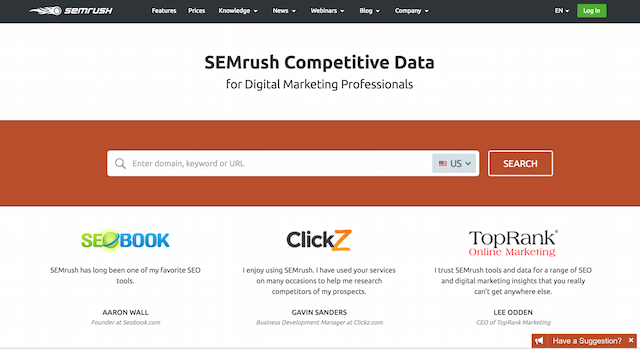This article was updated on Feb. 28, 2018.
Google rankings have a massive effect on your business’s success, whether or not you want to admit it. The idea that another company can control your success can feel like an unforeseen burden, especially for businesses that existed well before the advent of the internet. Who wants to think about Google rankings when there are so many other things to focus on as a business owner?
But the truth of it is that catering to Google can be an important tool to help you overtake competition and secure your company’s spot as an industry leader.
Instead of turning to the phone book or a local billboard, consumers are using search to find what they want, discover new products and companies, and make purchasing decisions. It is very rare for a business to grow with no presence on Google, despite stories of businesses that succeed through viral social media campaigns or by being selected by the it-celebrity of the moment.
Like it or not, your business’s Google rankings can have a huge effect on its success, growth, and meeting your goals.
The effects of being at the top of Google rankings for your industry can make a huge difference in your business — just as much as falling off of search results can decimate it.
We call the marketing techniques behind trying to improve your Google ranking search engine optimization, or SEO for short.
What exactly does it mean for a business to be at the top of Google?

Business owners can relate to getting hundreds of phone calls every year from would-be SEO service providers claiming they can “get you to the top of Google.” And there’s a good reason why they’re all promising being No. 1 in Google search results.
In 2013, one study showed the top Google result earned 33 percent of all traffic, while 18 percent of all traffic went to the second search result.
Don’t think securing the top spot in Google rankings can make a financial difference for your business?
Let’s use the percentage breakdown from the above study. Say 1,000 people search for something you sell on your website. If you made a single sale of $40 for every 50 visitors to your site, you’d make around $264 if your website was in the top spot. But if your website was in spot two, you’d only earn $144.
That’s nearly double the amount of revenue just by being one spot higher in Google search results.
If you dominate the Google rankings, you’ve got a significant advantage over other websites in the same search results. And if you’re on page two or three? Your website is akin to being nonexistent to the average Google user. Only 4.8 percent of people even look at page two. Improving your Google ranking is important to your business’ bottom line.
You can learn more about the importance of SEO for small businesses here.
But wait, isn’t there enough business to go around?
Let’s say you don’t sell items on your website but instead use it to introduce your service-based company. Surely people look at more than one website when researching a lawyer or a dentist, right? Does ranking in top spots on Google really matter for your business success?
It is much easier to brush off the realities of the effects of Google search results when it is harder to equate dollars and cents to website visits. When we start to think about our company as unique, offering better service than the competition and surviving on referrals from loyal customers, we tend to care less about how our website ranks in search results.
However, if no one can even discover your business online, there’s a slim chance you’ll get any business beyond referrals from your existing customers. Your customers are a finite resource that can be quickly exhausted for referrals, unlike Google search that can send new visitors to your site who have no other previous connection to your business.
Also consider this: when was the last time your business wasn’t accepting new clients? Instead of letting your business turn away new customers, wouldn’t you add to your staff to accommodate more clients?
Don’t for a second believe that your competition wouldn’t do the same if given the chance. Any business owner worth their salt will jump at the opportunity to serve more clients as long as their quality doesn’t degrade to the point it destroys their client relationships. Improving your website’s ranking should be part of your client acquisition plan.
There is only one website at the top of search results and that means one website is getting significantly more leads than the rest.
If your business isn’t even giving searchers a chance to find you, you’re limiting your growth potential and handing potential leads straight to your competitors who care about Google rankings. When your business has a high website ranking for important keywords, you can beat out the competition and create a sustainable business for the long-term.
Should SEO play a role in business planning?
Search engine optimization, or SEO, is when you do things to your website and online presence to improve your search rankings. Since it is so important for your business to rank as high as possible in search results, SEO should be part of your business. But SEO definitely has a reputation of being a scam run by spammers, thanks to those countless phone calls businesses receive promising “top Google results.”
It can be hard to tell the difference between a spammy SEO company and a legitimate SEO professional if you’re unsure about SEO lingo or where to start.
Truth be told, there’s a big difference between ranking No. 1 for your own business name and ranking No. 1 for highly competitive “money” keywords — or the keywords that a potential customer uses to find the right product or service when they’re ready to make a purchase.
A qualified SEO professional can explain your company’s opportunities for ranking in search results for important keywords to your business and help guide you to better ways to present your business online to increase sales.
SEO is no longer just about keywords; it focuses on identifying the needs of your potential clients, how they talk about their problems and needs, and how to put your business’s best foot forward online to turn visitors into customers. Using SEO in business planning can help you identify what products or services to focus on in your business growth, make product purchasing decisions, and more.
You can use information like potential search traffic, seasonal trends and competitor research to get a better picture of the market and help you to make more informed decisions about the direction of your business.
A seasoned SEO pro can help you make sense of all that information and what opportunities your company can take advantage of to perform better and grow. Plus, an SEO professional can give you solid direction for starting to work towards a higher Google ranking for your business’s website.
Improve Google rankings with this 3-step SEO checklist
Now that you understand the importance of Google rankings to your business, the next step is to do a quick assessment of your website’s rankings.
-
Determine what keywords your website ranks for.
-
Determine what keywords you should rank for.
-
Optimize your web content.
There are lots of paid SEO analysis tools available, but you can use SEMrush to get a quick picture of your website’s SEO performance for free. SEMRush is the easiest way to check your website’s rankings quickly and easily.
1. Determine what keywords your website ranks for
To check your website’s search rankings, visit SEMRush and follow these steps:
1. Go to SEMRush.com and put your website address into the search bar. This will pull up the Domain Overview Report.
2. Click on the View Full Report button on Top Organic Keywords to view your website’s rankings. This report will show you the top 10 keywords your website ranks for using the free report. Make note of these keywords.
3. Do some quick thinking about these keywords:
- Are they related to your company’s brand name and main services or products?
- Are they keywords that you would want your website to rank for?
4. Click the SERP (search engine results page) in the second to far right column to see a screenshot of the result page. Does your website rank above your closest competitors?
5. After looking through some of these SERPs for keywords your website ranks for, you’ll have a good idea of who your competitors are in search results. Scroll to the top and put the website addresses of your competitors, one by one, into the report bar.
- Note the keywords they rank on top for.
- Are there any keywords you should rank for, but don’t? Make note of these keywords.
Keep in mind that search results are personalized. That means when you enter a keyword in Google, your results might not match findings from SEO reporting tools. Use a reputable tool to get the most accurate results.
Editor's note: Need help? GoDaddy’s Search Engine Visibility tool analyzes your website for SEO opportunities, walks you through suggested improvements, and automatically publishes your approved changes on your website.
2. Determine what keywords you should rank for
Now that you have a better understanding of your business’s search ranking in comparison to your competitors, it’s time to determine the keywords you want to rank for overall (beyond the keywords you’ve already found).
1. Besides your business name, what is the most important phrase or search term someone might use when looking for a business like yours?
- Consider your industry.
- Consider your geographic location.
- Consider your unique selling proposition.
Pro tip: Keywords can even be whole sentences.
2. Go to SEMRush.com and put this phrase or keyword into the search bar. Scroll down to the Related Keywords report and click the View Full Report button.
This report shows other keywords you might like to rank for, with the number of monthly searches for that keyword and the difficulty for ranking. Most websites can successfully target keywords that are below about 70-percent difficulty.
3. Make note of keywords you’d like your business to rank for.
4. Repeat this process — looking at different keywords and their related keywords — until you have a list of the most important keywords you’d like to rank for in Google search results.
3. Optimize your web content
Armed with your keywords, the next step is to start putting them into the right places on your website to improve its SEO.
- Page title. Google uses the title of your page to rank your content. Make sure your page title has your most important keyword incorporated in a natural way.
- Meta description. Google doesn’t use meta descriptions to rank websites, but meta descriptions that include target keywords can help your website score more clicks from search engines. In addition to using keywords in your description, including a strong call-to-action to get the searcher to click through from search results.
- First sentence. Incorporate your main keyword at the beginning of your website’s home page copy to indicate its importance to Google. Try to use it in the first few words of the first sentence.
- Headings. Incorporate keywords in your H1 and other headings. Use synonyms and secondary keywords in your headings to avoid being repetitive. You should only have one H1 heading per page.
- Image file name. Before you upload images to your website, be sure to name them with descriptive file names that use keywords.
- Image alt tags. In the HTML behind the image, include keywords into your image alt tags to give Google more context about your images.
- Page URL. Try to incorporate your keyword(s) in your page URL. Remember: Create a redirect if you change a URL so you don’t lose any SEO!
- Website copy. Website pages should contain at least 300 words. Use your target keywords, as well as synonyms and secondary keywords, throughout the copy. Be sure to only use as many keywords as feels natural and without being overly repetitive.
Pro tip: Don't jam keywords in simply for the sake of adding keywords — that's called keyword stuffing, and it's a definite no-no.
You can learn more about website keywords and how to identify them in this guide.
In conclusion
No matter what the results show, it’s a starting point for using SEO on your website and can help give you a base for discussion with SEO professionals. Use these steps to get a picture of your website’s search rankings and what important steps you can take to improve your ranking in Google search results.
While there’s a lot more to SEO than just keywords, these three steps will give you a strong start. If you’d like to learn more about SEO, be sure to visit KimberlyHerrington.com.








